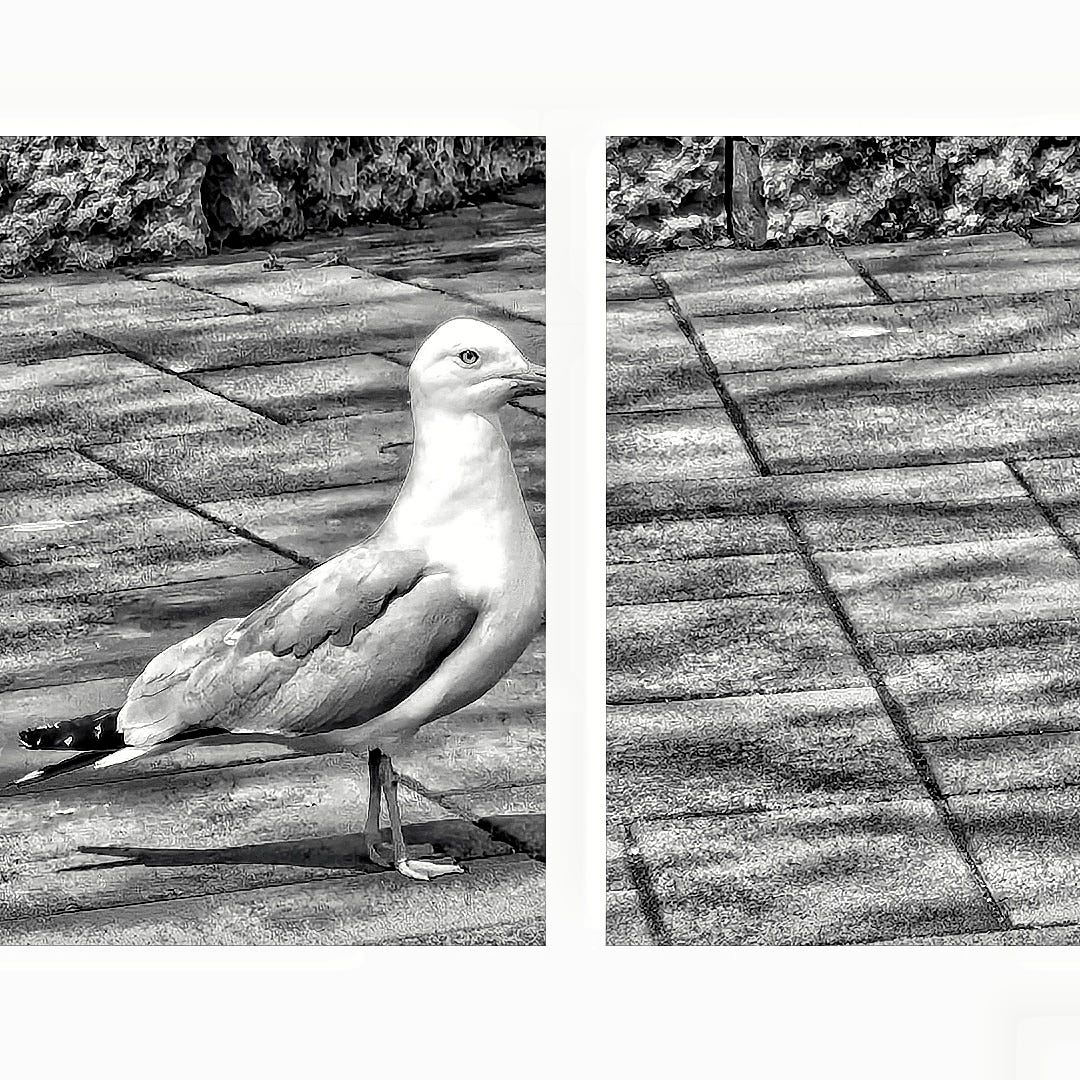Crucial facts lie beyond the time and place of interaction or lie concealed within it.*
Issue 42
Art
Niagara Falls, USA
S. Skelly
Report
Don’t turn away.
N. Agabian
On September 19th, 2023, Azerbaijan launched a widescale attack on Nagorno-Karabakh (also known as Artsakh), a formerly autonomous region governed by Armenians. Azerbaijan bombed civilians after starving them for nine months with a blockade of all food, medicine, and fuel. Before the attack, for the last three years, Azerbaijan had harassed and terrorized Armenians in both Artsakh and Armenia after launching an unprovoked war in the midst of the covid pandemic. In just one week, 100,000 Armenians in Artsakh fled for safety in Armenia.1 The surviving Artsakh population was forced to leave behind their homes, livelihoods, and culture. A community in existence for thousands of years came to an abrupt end.
After the 44-day war in 2020, when I saw the world turn away, I decided to publish The Fear of Large and Small Nations. I had hoped that if people knew our stories, it could serve as resistance to violence. Concurrently I joined the board of a small nonprofit, the International Armenian Literary Alliance, producing events centered around queer Armenian writers. I've been proud to be part of a growing Armenian literary force of writers and organizations. But the events of the past week have broken me.
The level of ignorance and apathy for a crime against humanity has been incredibly painful, for it portends more hate, more suffering, and more death for Armenians, this time in Armenia itself. Armenians are the victims of a geopolitical chess game, with Russia, the US, and the EU acting only in their own interests. The blockade was illegal and outrageous, a blaring warning sign for nine months, and the world did nothing: the media and the international community are allowing another genocide to happen, right under our eyes.
Most mainstream media are ill-equipped to report on the crisis, if it’s reported at all. They often continue to frame the events as a war, in terms of "victory" and "defeat" instead of ethnic cleansing and genocide.
Things you can do
Contact your representatives and support the new bipartisan efforts to enforce sanctions on Azerbaijan.
Donate to the All for Armenia fund to help displaced Armenians with food, housing and other essentials. I've heard from multiple sources that they are doing good work on the ground.
Many more resources of news, actions, and places to donate can be found here and here. A map of the region and more background can be found here.
If you're in the Boston area, join a silent protest on Thursdays in front of the Federal Building.
All the proceeds I receive from sales of my book in October will go directly to All for Armenia.
Art
Boston, Massachusetts, USA
J. Lincoln
Poem
Untitled
M. Dabis
Honeybees
surviving the last storm
collect today’s honey.
============
Bursting sunflowers
heads too heavy
to follow the sun.
============
Longing for warm lakes
settling for dogwood
and paper wasps.
Dispatch
That’s for you.
C. Halley
At sixteen, my best friend Denise and I got hired as busgirls at a red sauce Italian restaurant that anchored a strip mall in Chesterfield, Missouri. It was late June, 1983. Every morning we’d spray our hair with Sun In and hang out by the kidney-shaped pool in Denise’s backyard. On the days we had the early shift, I’d run home to shower at 3:00pm, then drive my mom’s white wood-paneled Ford station wagon the ten hot suburban miles to work with the window down, listening to KSLQ play The Police’s “Synchronicity.” Dirty old men would slow down to eye my fitted tuxedo shirt and bow tie and try to talk to me at intersections. I’d roll up the window and give them the finger. By the time I clocked in at the restaurant, I was unfazed by the dishwasher’s lewd comments.
Before customers arrived, Denise and I sat at empty booths in the icy air conditioning, folding napkins into Pope hats and gossiping about our boyfriends until we were assigned our stations for the night. There we’d make coffee in insulated stainless steel pots, tearing the silver foil wholesale coffee packets open along the perforated line. I didn’t drink coffee at the time, but the smell of it as I poured the grounds into the flimsy, oversized filters delighted me. Out on the floor, the place was dark and stank of the industrial cleaner they used to wipe the tables between seatings. We’d stand around with our hands clasped behind our backs, earning $2.13 an hour plus the tips that management claimed would push us past the $3.35 minimum wage, waiting for the early-bird diners to arrive at five.
I lasted in that job longer than Denise because I actually needed money. Once, I got a $50 bill from some generic white middle-aged dad who felt bad, I think, for mistaking me for a boy. “Sir,” he summoned me as I walked by the six-top where he sat, “can you take this dish?” He held an oval plate of pasta towards me. Everyone who ordered meat or fish for their main course got a side dish of pasta—a choice of baked ziti, spaghetti with or without a meatball, or cavatelli alfredo. It was too much food. As I turned around, I saw him register my blue eyeliner and his eyes darted down to my breasts, which were big for my frame—friends had tried to nickname me “chicken legs big boobs” but fortunately it hadn’t stuck. Everyone at the table—some women, more men—looked at me. “Oh, uh, sorry,” he stumbled. I half laughed, “Do you need this wrapped?” I asked, taking the plate. “No, thanks,” he said casually, hoping to smooth over the awkwardness. I turned around and headed straight to the kitchen, where I proceeded to shove his leftover cavatelli alfredo down my gullet before I went back out on the floor to fill people’s glasses with water that they usually never drank.
Part of me was pleased. “Make me look like a boy,” I’d told the gay hairdresser at my mother’s salon earlier that year. He gave me a short, asymmetrical Thompson Twins haircut, so I did look like a boy from behind if you ignored my waist. The whole New Wave-band, gender-bending aesthetic intrigued me at a subconscious level, but it would be another three years before I realized that I was queer.

Back out on the restaurant floor, I continued to serve the table with the man who’d call me “Sir.” When I came by to fill water glasses or give them shitty tiramisu for dessert, everyone at the table followed his lead and engaged me in slightly forced small talk, the kind of restaurant banter that the sociologist Erving Goffman might attribute to everyone acting out their assigned roles as customer and servant.2 The banter gave me a chance to charm the table, to tuck things back into their tidy categories. I knew how to be a good little busgirl.
As they were getting up to leave, the man called me over to the table. “Excuse me, Miss,” he called—not exactly the converse of Sir—gesturing as I walked by. He had something in his hand and held it out to me as I approached. Oh, I thought, I get it now. I assumed it was his business card—that had happened before. Enough sixteen-year-old girls in the world must have responded to men like him to make this worth the try. I was getting ready to take it just to be nice. But he wasn’t giving me his number. It was a fifty-dollar bill, folded loosely in half and half again with the number 50 deliberately showing. “That’s for you,” he said. He slid it into my hand on the sly as everyone at his table stood up. “Oh, um, thanks,” I said, not exactly registering what was happening.
I was confused. The busboys and girls were usually tipped out by the waiters at the end of the night. It broke the rules for a customer to tip one of us directly. And tips like that fifty were rare even for the waitstaff. I wasn’t sure what to do. Should I tell the waiters? Give it back? It had been proffered in semi-secret, maybe so the tablemates could see, but not the waitstaff? Maybe so the men at the table could see, but not the women? In any case, I was supposed to see. It was a pointed gesture and I was the target, chosen deliberately by a man expressing his authority—to gloss over an error or to solicit something he wanted, I wasn’t quite sure which—with cash. Topdog/underdog.
That night in the restaurant was not the last time I’d feel targeted this way but the lessons I gleaned—about how to tip, about how to accept cash with the double consciousness of a woman in a man’s world—that one episode turned me into such a weirdo about tipping. One awkward gesture and from then on, I couldn’t get a haircut, take a cab, order a drink in a bar, take a tour, or accept a neighborly favor, without registering the subtle effects, indeed accounting for the devilish details of power. Over the years, I’ve learned over and over again that tipping well is a kindness, except when it’s a power move. Or a pity party. Or so excessive, it creates a sense of obligation. Especially for women. And it’s really, really hard to do it well.
I took that man’s fifty, put the bill in the pocket of my black polyester blend trousers and went to find Denise, but she was already gone—her section had been slow and she’d been sent home early. So I kept the money a secret, even from her. I didn’t get any other big time tips that season, or ever again, but somehow I started to expect them and to be disappointed when they didn’t come. And perhaps because of that, as I grew older, I settled into a habit of overtipping—and maybe, at some deep level, for the guilt I felt for not sharing that fifty dollar tip.
I saved the fifty dollar bill along with the rest of my spare wages. By the end of summer, I’d earned enough to buy back-to-school clothes in every color of the pastel rainbow from Esprit. The clothes together with the Thompson Twins haircut reflected my emerging gender expression. Being a girl sometimes mistaken for a boy, a girl with a little sass, was just right for me as an adolescent. It was a physical manifestation of the power I claimed. But I still, to this day, overtip.
Art
Niagara Falls, USA
S. Skelly
Vieste, Italy, by T. Bull.
2 minutes 1 second.
Audio description: Wind blowing. People laughing. A motorbike passing. Long calls of seagulls.
*Goffman, Erving. The Presentation of Self in Everyday Life, Edinburgh: University of Edinburgh Social Sciences Research Centre, 1956.
Goffman’s 1974 book Frame Analysis explored culturally determined definitions of reality that allow people to make sense of objects and events. Individuals have the power to transform social reality and in attempting to do so, reveal the underlying hegemony around inauthentic reality.
Like what we do? We have a Ko-Fi for that.
Make art and/or writing. Send it to info@behindadoor.com. We will publish submissions in this ezine or in our first limited edition handbound chapbook. Thanks for reading Behind a Door!






